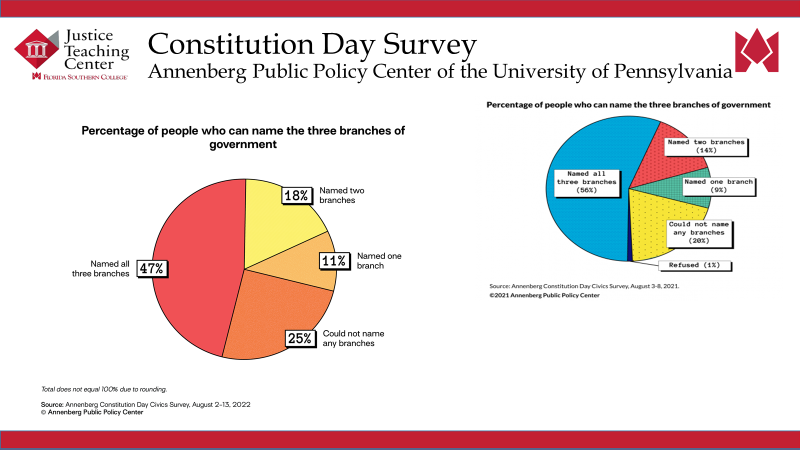Adult and Higher Education Civic Learning
Students in elementary and secondary schools are not the only demographics in need of civic education. Surveys conducted by the Annenberg Public Policy Center at the University of Pennsylvania since 2006 have documented the limited knowledge adults have about our government and the United States Constitution. The results of the 2022 survey documented that only 47% of Americans could name the three branches of government (Annenberg Public Policy Center, 2022). Additionally, twenty-five percent of those surveyed could not name any of the three branches.
Florida’s civic literacy K-12 requirements include state standards in civics and government at all grade levels with specific emphasis in middle school and high school. A middle school course in civics is required in Florida and a high school American Government course is required for graduation. More recently, Florida enacted a civic literacy requirement extending beyond grades K-12. The requirement mandates that students seeking an associate or baccalaureate degree and entering a Florida College System (FCS) institution or a state university, in must demonstrate competency in civic literacy by achieving a passing score on an assessment and by successfully completing a civic literacy course (s. 1007.25, Florida Statutes).

The civic literacy competencies in higher education identified in rule 6A-10.02413 Florida Administrative Code (November 2021) include:
- Understanding of the basic principles and practices of American democracy and how they are applied in our republican form of government;
- An understanding of the United States Constitution and its application;
- Knowledge of the founding documents and how they have shaped the nature and functions of our institutions of self-government; and
- An understanding of landmark Supreme Court cases, landmark legislation and landmark executive actions and their impact on law and society.
There are many ways to engage with college and other adult education populations to improve civic knowledge. There are college and university classes (required and elective), civic groups and community forums, library programs, and many other opportunities to interact with the public in educational programs.
Questions? Contact
